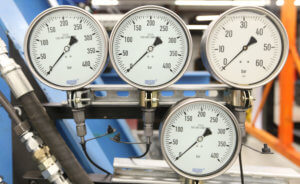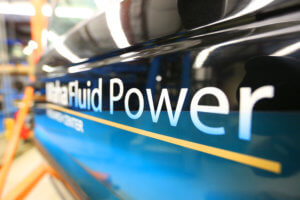A sound foundation for a fluid future
“I spent 2,000 hours behind soundboards in high school, running them for bands and my church,” Paul Kalbfleisch estimated. “Everyone in my childhood told me I should be an engineer, that I had the knack and the aptitude.”
Now a graduate research assistant in Agricultural and Biological Engineering (ABE), Kalbfleisch plans to complete his doctorate this fall, earning his third Purdue degree.
“Many people say it’s more advantageous to diversify your universities in grad school,” explained Kalbfleisch. “It shows that you can be successful in various academic environments. I considered that advice, but Purdue was the best at what I wanted to do. At the time, Purdue was ranked number one in the country for ABE and number seven for mechanical engineering.”
 Kalbfleisch stayed in the Purdue College of Engineering as he earned his acoustical engineering bachelor’s and a master’s in mechanical engineering. As his interests narrowed to fluid power acoustics, Kalbfleisch applied to ABE. The program served as Kalbfleisch’s introduction to agriculture.
Kalbfleisch stayed in the Purdue College of Engineering as he earned his acoustical engineering bachelor’s and a master’s in mechanical engineering. As his interests narrowed to fluid power acoustics, Kalbfleisch applied to ABE. The program served as Kalbfleisch’s introduction to agriculture.
“The agricultural industry is a huge part of the push for fluid power,” said Kalbfleisch. “The farming community, as customers of this technology, have been continuously advocating for advancements. For example, people know about the Prius and its fuel efficiency. A lot of that comes from a power-split transmission, which first showed up predominantly in tractors. Fluid power technology is everywhere, but nobody realizes it.”
Kalbfleisch’s research hopes to identify and reduce noise created by fluid power, allowing for additional applications of the technology.
“The number one preventer of fluid power implementation is noise,” explained Kalbfleisch. “When it comes to situations like the long working hours required by agriculture, noise fatigue can play a lot into a machine user’s quality of life.”
“Interestingly, there is not a lot of research on fluid power noise. To be able to control the noise, you first have to know where it comes from. That is why I keep working at it. It’s discovery and diagnosis before treatment, like in the medical field.”
Purdue’s research on the topic is conducted at the Maha Fluid Power Research Center, the United States’ largest academic hydraulics lab.
Kalbfleisch had previously studied at the center as an undergraduate student through the Summer Undergraduate Research Fellowship Program (SURF) under Monika Ivantysynova, the center’s director and founder.

“My life at college has been quite the unique ride,” Kalbfleisch shared. “When I joined the lab, I had my first tumor and had surgery. They let me out of the hospital early so I could come straight to SURF and do research. Within a week, I was working on our sound chamber.”
“Two years later, I was going to do an independent research project with Monika and ended up getting sick again. She helped me get back on my feet.”
“I was still at the lab when Monika got sick in spring 2018,” Kalbfleisch recalled. “The roles switched.” Ivantysynova passed away in August 2018.
“Monika would go above and beyond to take care of people when they needed help. She was an esteemed researcher in the fluid power community, yet everyone called her Monika all over the world. It was her way of being more personal.”
“Our lab remains quite different than a normal graduate student experience thanks to the way Monika set it up,” Kalbfleisch noted. “It is meant to be halfway between industry and academia. We, as grad students, are treated as industry engineers. Now, Andrea Vacca is continuing with that tradition.”
“The great thing about grad school is it’s given me the intellectual freedom to explore the ideas I want to explore. I can much more clearly define what I am interested in than when I started at Purdue. Then, I just wanted to do something ‘noise-related.’ Over the years, I’ve found the niche I enjoy.”






